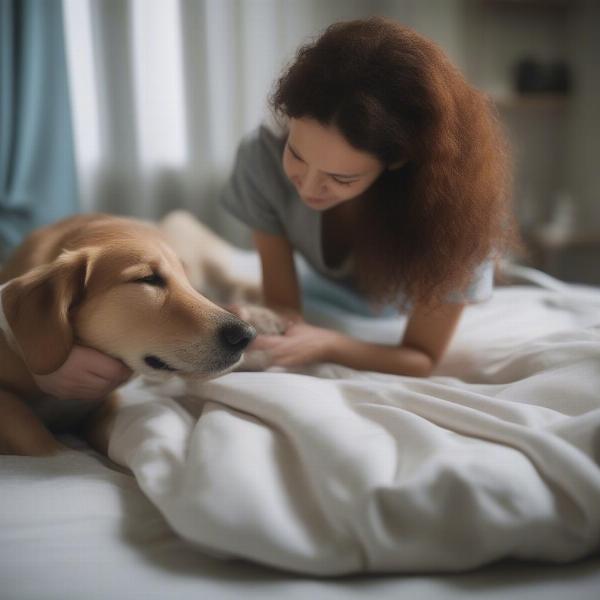After your furry friend undergoes anesthesia for a medical procedure, it’s not uncommon for them to exhibit some unusual behaviors, including whining. While this can be concerning, it’s often a normal part of the recovery process. This article will explore the reasons why your dog might whine after anesthesia, what you can do to help them, and when to seek veterinary attention.
Understanding Post-Anesthesia Whining in Dogs
There are several reasons why your dog might be whining after anesthesia. Pain is a common culprit. Even with pain medication, your dog might still experience some discomfort as the anesthesia wears off. Disorientation and confusion are also frequent after-effects. The anesthetic drugs can leave your dog feeling groggy and unsure of their surroundings. This can lead to anxiety and whining. Nausea is another potential side effect of anesthesia, and whining can be a sign of discomfort. Finally, some dogs simply whine as a way to seek comfort and reassurance from their owners. They might be feeling vulnerable and need extra attention during this time.
Managing Your Dog’s Discomfort at Home
If your dog is whining after anesthesia, there are several things you can do to help them feel more comfortable. First, ensure they have a quiet, comfortable, and safe space to recover. Minimize noise and activity around them, and provide a soft bed or blanket. Keep the room dimly lit to reduce stimulation. Follow your veterinarian’s instructions regarding pain medication and any other prescribed medications. Offer small amounts of water frequently to help prevent dehydration, but avoid giving large meals until your dog’s appetite returns. Gentle petting and reassurance can also help calm your dog and alleviate their anxiety.
 Comforting a dog post-surgery
Comforting a dog post-surgery
When to Contact Your Veterinarian
While some whining is expected after anesthesia, it’s important to monitor your dog for signs of complications. If the whining is excessive, persistent, or accompanied by other symptoms like vomiting, diarrhea, difficulty breathing, or pale gums, contact your veterinarian immediately. These could be signs of a more serious issue. Also, if your dog’s pain seems uncontrolled despite medication, or if they are not showing any signs of improvement within a reasonable timeframe, seek veterinary advice.
Is it Normal for My Dog to Shake After Anesthesia?
Yes, it’s quite common for dogs to shiver or tremble after anesthesia. This is often due to the effects of the drugs and the drop in body temperature during the procedure. Providing a warm blanket and a comfortable environment can help alleviate this.
How Long Will My Dog Be Groggry After Anesthesia?
The duration of grogginess varies depending on the type and amount of anesthesia used, as well as the individual dog. Most dogs will be groggy for 24-48 hours, but some may take longer to fully recover.
Can I Give My Dog Food After Anesthesia?
It’s best to follow your veterinarian’s instructions regarding feeding after anesthesia. Generally, it’s advisable to offer small amounts of water initially and gradually reintroduce food as your dog’s appetite returns.
Conclusion
Post-anesthesia whining in dogs is often a normal part of the recovery process, but it’s essential to monitor your dog closely and seek veterinary attention if you have any concerns. By providing a comfortable environment, following your veterinarian’s instructions, and offering plenty of reassurance, you can help your furry friend navigate this period and return to their normal, happy selves. Remember, if your dog’s whining seems excessive or is accompanied by other concerning symptoms, it’s always best to err on the side of caution and contact your vet.
You can find more helpful articles about dog health and care on our website. Check out our resources on post-operative care, pain management, and general dog health tips.
ILM Dog is a leading international pet website dedicated to providing expert advice and resources for dog owners worldwide. We offer comprehensive information on dog breeds, health, training, nutrition, grooming, and much more. From puppy care to senior dog care, we’re here to support you every step of the way. For expert advice tailored to your dog’s specific needs, contact us at [email protected] or call us at +44 20-3965-8624. Visit ILM Dog for more information.